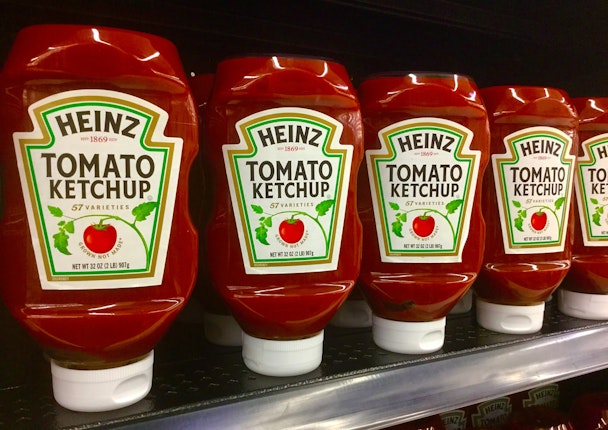Kraft Heinz CMO denies brand underinvestment amid stock tumble
Kraft Heinz’s global brand officer has labeled claims the company’s dismal financial results are the consequence of brand underinvestment as a “misconception” and stated last week’s figures would not have an effect on upcoming marketing budgets or strategy.

Luz: 'There are a lot of people commenting on the side lines'
Kraft Heinz stock sunk by 27% last Friday (22 February) after the company missed earnings predictions. In what the Wall Street Journal dubbed “an avalanche of bad news”, dividends were knocked down from $2.50 a share to $1.60 and $15bn was written off the value of flagship brand Kraft and sausage-maker Oscar Mayer.
Several analysts have blamed the flagging figures on the drastic cost-cutting measures implemented by 3G Capital, the Brazilian private equity firm that runs the company. Critics argue innovation and marketing investment have paid the price throughout Kraft Heinz’s ruthless fat-cutting and zero-based budgeting, which left its brand properties exposed in a fragmenting market and consequently saw value wiped from two of its most famous entities overnight.
Eduardo Luz, the company’s newly-installed global brand officer, who also holds the role of US chief marketing officer, has rebuffed this analysis.
“It’s a misconception,” he told The Drum, stating business “challenges” have arisen from cost increases of raw materials, transportation and the like, and are “nothing to do with the brands”.
The company has invested “hundreds of millions of dollars” in “cleaning up” the portfolio’s ingredients across the past three years, while investment in the Heinz brand is now “five-fold higher” than it was when the merger between Kraft and Heinz was inked in 2015, Luz stated.
“Some ... brands will take more time to be stabilized or turned around, and that’s not always an easy job,” he said. “But it doesn’t mean we’re not taking care of them. We have work to do on some brands and that’s what we’re doing.”
Luz added the financial results will not affect slated brand strategy “in the slightest”. Indeed, money seems to be flowing: Thursday (1 March) saw Oscar Mayer and Devour, Kraft Heinz's frozen foods brand, resign a multi-year partnership with sports organization UFC.
“There are a lot of people commenting on the sidelines without the data,” said Luz. “I’m very confident with the approach and I’m confident in where the investment is going.”
Five-pronged brand investment
Luz has earmarked five key areas in which to invest. There’s Springboard, the team dedicated to incubating and partnering with upcoming brands that closed its first acquisition – Primal Kitchen – in January. White Spaces allows marketers to “put on their consumer hats” and dream up category-agnostic innovations, while the department for ‘personalization at scale’ focuses on CRM.
‘Tech platforms’ takes a long view in developing ingredients and packaging innovations “that we can patent to [gain] a competitive advantage in the future”. Complementary to this is the ‘Sprint approach’, which Luz describes as a new, “superfast funnel” that innovates ideas in weeks, not months.
The Sprint team works closely with marketing operations as part of Luz’s grand plan to press fast forward on Kraft Heinz’s communications – a remit that was handed to him as the company’s first-ever global brand officer.
“We want to [operate] at the frequency of culture and frankly, that is a new cycle – 24 hours, 48 hours, sometimes 72 hours,” he said, citing the creation of the Kraft Now, Pay Later store during the US government’s shutdown this year as a prime example of an idea being developed and executed speeds that were previously unheard of in the company
Speeding up marking and innovation
This success of this strategy is contingent on two key factors: internal accountability and external endurance. The former means “200 CMOs for 200 brands”, a strategy Luz believes empowers brand marketers to make braver decisions and reduces bureaucracy across departments such as legal and finance.
Luz, who previously controlled and grew the company’s $9m grocery account, likens this approach to hiring “restaurant owners, not waitresses”, and has equipped these brand guardians with a series of 10 guiding principles dubbed ‘the KHC Way’.
Secondly, it has meant Kraft Heinz agencies have had to adapt to these speeds, too. Some have not been able too, Luz stated, which has led some of the company’s chief marketing officers to forego heritage agencies for more nimble players, such as VaynerMedia, which now holds the Planters and Miracle Whip accounts.
On the other hand, a number of agencies including Leo Burnett and Mcgarrybowen, have stayed the course.
“I’m constantly meeting new agencies and finding new people,” said Luz. “With 200 brands, we almost have space for everybody. If we find an agency we feel will be agreeable of this way of operation, we’ll try to make it work.”
The groundwork laid by Luz only three months into his new job makes his cool assuredness easy to buy into, even in the face of concerned shareholders. But as consumer tastes edge further towards healthier options, and rival businesses such as Nestlé, Mondelez and Unilever also ramp up the speed at which they innovate and produce content, Luz may find last week’s writedowns have already put at least two of his brands too far behind in the race to remain relevant.
Luz spoke to The Drum at the ANA Brand Masters conference in San Diego

